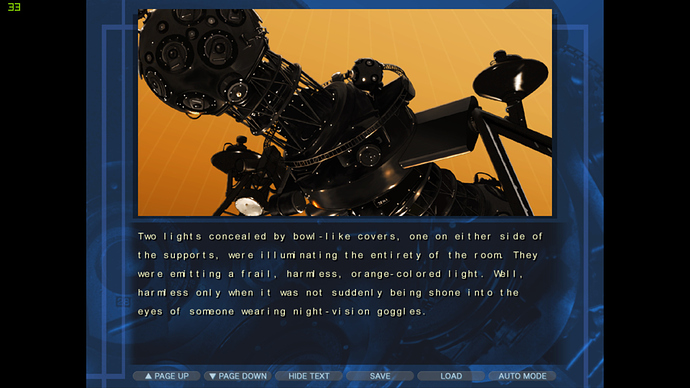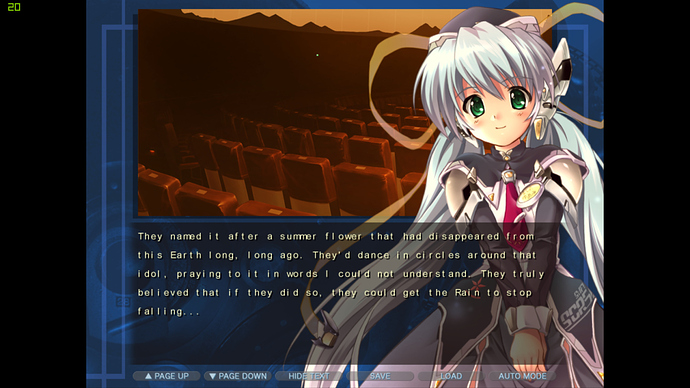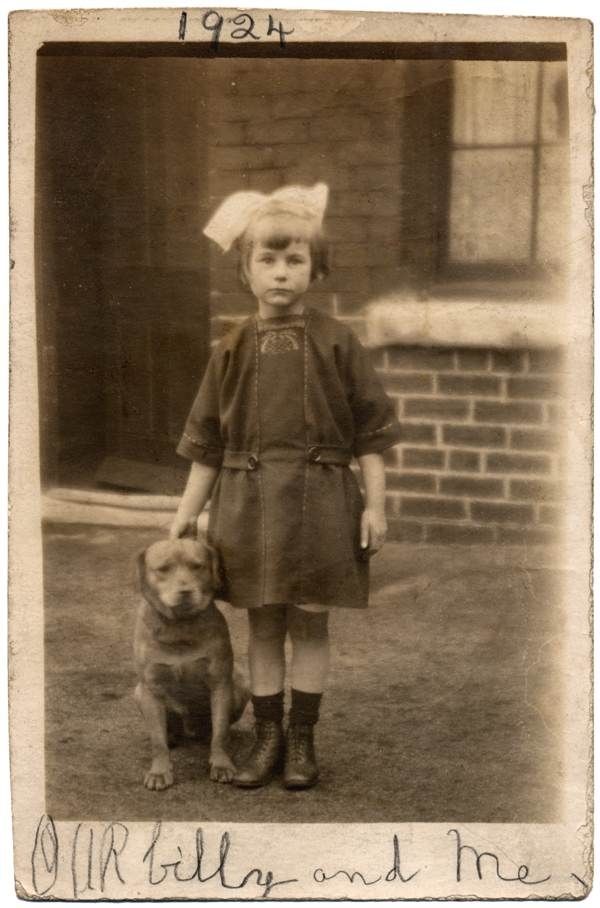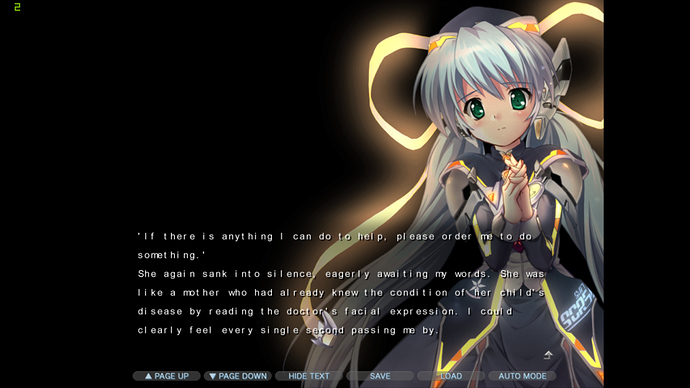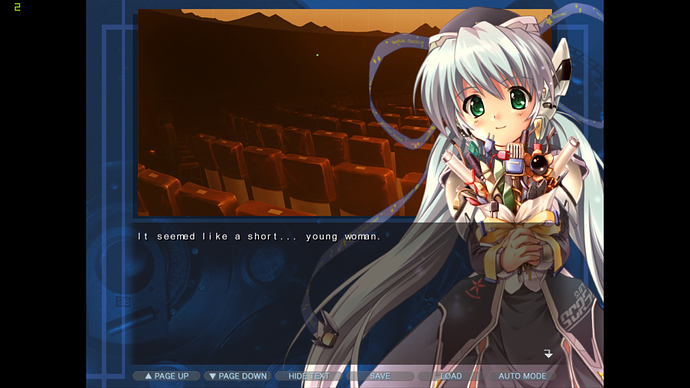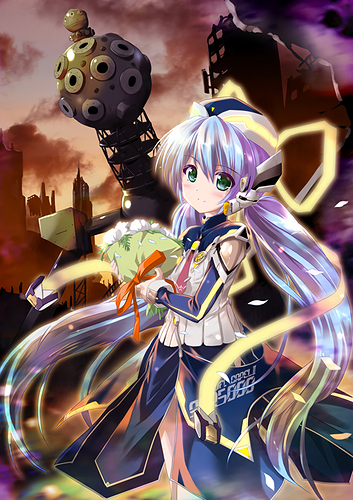Before I comment on other’s posts (good gravy there are some really extensive ones here i love it!) I wanted to clarify the last sentence of my original post, because it doesn’t seem to be something others have written about yet and apparently orange is an important color in other Key works, leading to rumors that i may have in fact cheated or worse, been spoiled! This injustice shall not stand!
It was something that stood out to me fairly early on, the entire planetarium is bathed in a soft hazy orange color. The seats are this color, the backdrop of the strong metal projector itself is this color, and it is described as being ‘frail and harmless’ by Mr Customer.
This immediately indicated to me that I should be looking for other soft orange-colored objects that fit that specification, and, well,
The info ribbon, the gem in the center of her chest, the flower and linings on the lower part of her dress, and lastly the earpiece that she uses to connect with the projector through its cable, are all a similar color. This leads me to believe that the hazy orange color is associated with both the planetarium and its sole denizen. The relationship between Jena and Yumemi is represented by both the literal cable along with her dependency on a battery as a power source and the tale which she tells of the tragic heroine trapped for all eternity, the hope that someone, anyone, will come to the planetarium to help her. So from this, I extrapolate that this color is symbolic of the ‘fragile hope’ which Yumemi and the planetarium represent in the world, they are a sole, temporary safe haven for Mr Customer (no I won’t stop calling him that) the orange light is welcoming and in terms of visual design helps to put the reader’s mind at ease while they read. The entire space has a feel to it not dissimilar to the viewing of old photos like this one:
Visually cementing the planetarium as a thing of the past, something that we reminisce about but can never truly obtain. The viewer that the images are displayed in also encourages this mentality, it’s almost like we’re viewing the story through a projector ourselves. Yumemi is the only thing that isn’t constrained by the image box, the only possible thing in the world that can reach out to her audience.
Oh would you look at that, she’s literally the only thing that can reach us in this scene and her orange and yellow bits are lit up like a christmas tree. She is a single, hopeful, selfless being in a broken world filled with darkness.
Just a final piece of visual evidence, the object Yumemi uses to try and pass the hope torch on to Mr Customer is her ‘bouquet’ an object that despite not being organic flowers has much more meaning (more commentary on machine vs organic human but I’ll get to that later). There’s a bunch of orange here too, particularly the object most closely resembling an organic flower on the right there, the object that looks strikingly similar to the flower that’s on her dress that is also orange. Any questions? 
In Japanese culture orange is symbolic of love and happiness. It conveys a sense of peace and nostalgia through its context in the novel. It’s used to tie the bouquet and Yumemi and Jena and the planetarium as a whole into this one big orange ball in a world of grey and blue (colors associated with technology and progress). Orange represents the world that humanity left behind, and a world that could be. In that last sentence of my post I joked that if the memory card had only been of the same color it might have compelled him to hold onto it tighter and to seek a return to the old world, one that Yumemi dreams of and he can only dare hope for.
UPDATE: Well it’s looking like my next segment will be about the religious subtext of the game, @JDC has done some pretty thorough breakdowns of the story from a Christian perspective and I’m interested to see what extra meaning I can add on three years down the line. I lean strongly towards atheism myself but grew up in a Christian household so this should be interesting.
I’ve read them all! cackles maniacally I have reached the end of your posts and now may comment at my will. I’ll try and keep things chronological as much as I can. From the top! 
A lot of you commented on the use of Christian symbolism in the story, I’ll be honest I was more paying attention to the general theme of religion as an ultimate happiness in life but @JDC broke things down in an extremely thorough way, in particular the discussion of prayer and worship surrounding Jena and then their follow-through with the description of Yumemi as a ‘priestess’, implying that she is here to protect Jena and the planetarium, and to spread the word of her god. I think it’s pretty obvious given the sheer amount of religious symbolism that the novel is preaching a Christian message. i think Yerian’s observation in particular gives the world a lot of context.
The rain is an allusion to the story of Noah’s Ark as @Mogaoscar pointed out, in which all of the sinful humans of the world are washed away and only a handful of blameless (meek) individuals are left behind to inherit the earth. It is the weight of humanity’s sins, plain and simple, and is a tragedy that we have brought upon ourselves in this dystopian future. In the Bible this sin is irredeemable except for the sacrifice of God’s son, Jesus Christ, and for all intents it seems Yumemi fits this role perfectly. She has no sin thus the rain does not harm her and at the end of the novel she gives up her life so that Mr Customer can be absolved and ‘resurrected following his three days of penance in the prison of grease which I’m 99% certain is an allusion to Purgatory, mirroring Jesus’ three days of combat with the Devil after he was killed on the Cross. The time spent in labor and then the savior’s sacrifice is what will purge the ‘sin’ from Mr Customer’s soul and send him on a path of redemption.
Speaking of sin, I unfortunately didn’t take a screenshot of it but there were definitely mentions of the planetarium as a ‘garden’, which once again seems to reference Biblical stories, this time the Garden of Eden. The moral of temptation is less prevalent here but it seems to reinforce the fact that the building, like Yumemi, is sinless. They are both unmarked by the sin of humanity, oblivious to the terrible things which brought about the destruction of their world. As a ‘sinless’ being who has not eaten of the apple of knowledge and has not been ejected from the great Garden of Eden surely she of all people is eligible for a place in heaven?
Heaven in any religion is ultimately a reward for following the beliefs of the creed. This typically involves doing good deeds and I have spoken with many people of Christian belief who believe that without religion and without God guiding us towards a proper morality we wouldn’t have one, we would cease all civilization and become lawless fools. This is represented by Mr Customer, who is tainted with sin (he doesn’t think twice about killing fellow humans and taking their car afterwards, he doesn’t want to communicate with yumemi on first greeting her, viewing her happiness and lawfulness as annoying) whereas Yumemi occupies a religious status, she follows her religion (her programming) and is promised by her fellow staff members a place in ‘robot heaven’ as a reward.
And here we come to the discussion of sentience, or ‘sapience’ as @VyseGolbez defines it. Yumemi herself denies that anything is wrong with the world and at the very end of the novel it’s revealed that she has known for a long time that everything. All of her data pointed to the fact that humans had abandoned her, that no one would ever come to the planetarium again, and yet she stayed waiting, hoping for someone to show up. She followed her ‘creed’ perfectly by protecting Mr Customer from the Fiddler Crab and by the doctrine she should be able to reach a heaven at the end of the novel.
Wizzerd provides an excellent question, does Yumemi go to heaven? Is she rewarded for her hard work and reach the promised land? To me this is a very fundamental question pertaining to the foundation of religion, what gives a human a soul? What is it about the human that separates it from animals, from life that they have created with their own hands? If humans can go to heaven why can’t other lifeforms? The answer is left ambiguous at the end but i believe that @VyseGolbez is on the right track
Yumemi frequently disobeys orders, deciding for herself which things that Mr Customer tells her are important. She follows her ‘prime directive’ (to protect humans) at the end but it’s out of genuine care for the person who fixed her Jena. The holographic projections at the end prove that not only does she remember the kindness that others have shown to her, but she is affected by it. Her programming, like the Crab’s, has changed over time. her endless repetition of her key phrases inviting people to visit the planetarium are more a desperate plea than a formal greeting. Appearances can be deceiving in this novel.
Oh, the other thing I’d like to do is answer @Yerian’s question.
Who is the Planetarian?
Honestly, it’s gotta be both. The full title is Planetarian ~the reverie of a little planet~ and I believe that 'planet is referring to both the literal planet of Earth and the self-contained space (heh) within the planetarium. In this way the planetarian is both someone who is in reverie (a state of being pleasantly lost in one’s thoughts; a daydream) about the planet. At the beginning of the story this absolutely has to be yumemi, but as the orange bouquet of hope is passed to Mr Customer their role switch, Yumemi is crushed by the world after being exposed to sin and Mr Customer becomes the new planetarian, he now carries aloft the torch of hope, burning a bright orange.
Speaking of which I would like to thank HeliosAlpha for posting this wonderful image of Yumemi holding a beautiful bouquet of flowers with a large orange bow wrapped around it.
Is the sun setting or rising? It’s difficult to tell~
Also @HeliosAlpha your entire post on the significance of the term ‘broken’ was just magnificent. I believe it’s the small details that make a piece of media great, and your analysis of the word is just too beautiful. if I could give you more than one 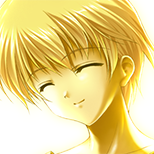 I would. Seriously everyone should go read that post.
I would. Seriously everyone should go read that post.
Just, man, keep going it’s brilliant.
I would be remiss to avoid commenting on Sir @Mogaoscar’s tale, one of tragedy and heroism, of fighting against authority, of hope and the stars. I thought it was an excellent story and really highlighted the way that media can affect an individual, and also is an excellent example of human’s tendency to self-narrate their lives.
As strange as it may sound, this is the past that stood out the most to me. I myself have never been a confident note-taker. In class, while reading literature, while crafting theories, wherever i should be writing things down to remember them, i wasn’t. But then I realized all you have to do is try. Practice makes perfect after all, and i tell this to every single person telling me “I wouldn;t be very good at writing, I’m not creative enough” or “I don’t want to write an essay from x book because there’s not much to talk about” or even “WHAT IF I GET THE AN ANALYSIS WRONG!?” Quite frankly I want as many people expressing their thoughts as possible, I talked about this over on Rokkenjima.org in the third Higanbana podcast (shameless plug) but i fundamentally believe that it is incredibly important for everyone to have their say and that everyone’s perspective is important. It doesn’t matter the reason why you don’t want to express their opinion, throw it out the window because your own analyses is important to a diverse discussion.
Well, I have some other thoughts in my google doc but they’re kinda disjointed and I’m not sure if I can fit them in here without just slapping them on the end. So you know what? I’m just gonna link it down here if anyone wants to take a looksie.
If anything catches your eye feel free to respond or message me or whatever you’d like, maybe even throw some comments in the doc in different colored text maybe orange? This file will serve as my own memory of my time with Planetarian so feel free to contribute as you like. 
EDIT UNO: Oh my goodness I missed something else amazing. Yumemi is a ‘Bargain Edition’ model. You know, like when you have some kind of transaction that needs to occur and you don’t have anything to offer, so you offer up something else instead? Even more evidence that Yumemi is a Christ-figure. She’s been bargained away for Mr Customer’s absolvement of sin in the same way Jesus died for humanity’s sins. There’s just too many allusions here how did I miss this!?!?
EDIT DOS: Saul (who later became Paul) journeyed for three days in the bible story after being blinded by God’s presence on the road. my earlier note about Mr Customer’s labor in a ‘prison of grease’ more likely is a reference to Saul’s blind state at the time, and even Mr Customer’s lack of food by the end mirrors Saul’s experience:
As he neared Damascus on his journey, suddenly a light from heaven flashed around him. He fell to the ground and heard a voice say to him, “Saul, Saul, why do you persecute me?”
“Who are you, Lord?” Saul asked.
“I am Jesus, whom you are persecuting,” he replied. “Now get up and go into the city, and you will be told what you must do.”
The men traveling with Saul stood there speechless; they heard the sound but did not see anyone. Saul got up from the ground, but when he opened his eyes he could see nothing. So they led him by the hand into Damascus. For three days he was blind, and did not eat or drink anything.
— Acts 9:3–9, NIV
So Yumemi is Jesus, Mr Customer is Saul before he is transformed into Paul by his encounter on the road with Jesus, he even ‘persecutes’ Yumemi up until his transformation in the same way Saul did before being shown the love that she offered him, and afterwards he becomes her ‘apostle’ to spread her word. I’m growing more confident that Mr Customer lives through the ending based on the religious context, though unfortunately this will probably lead to a martyring of some kind, which is the best guess historians have of how Paul the Apostle died in the end. He even lays down his grenade launcher, the tool he was using to threaten Yumemi in the very beginning, the persecutor has changed his ways and now goes to spread the good word. He can even preach a similar message to Paul, that Yumemi will return one day because he has her memory card. What a damn clever analogy. Planetarian is pretty sneaky for such a short story.
EDIT TRES: Well I can’t promise this will be the last one, but I looked up the flower shape that’s on Yumemi’s uniform and this was the first thing that popped up:

This orange star shaped flower is called (wait for it) THE STAR OF BETHLEHEM. I cannot handle the level of detail put into this. The entire story is soaked in biblical references.
